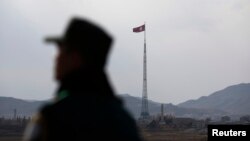My works were not written by talent but by righteous indignation, not with ink and pen but with tears of blood and bones. -- Prologue to The Accusation by Bandi.
What separates Bandi from other outspoken critics of the Kim Jong Un regime is that he is still living inside North Korea.
Bandi is not his real name. Do Hee-youn, an activist with The Citizens Coalition for Human Rights of Abductees and North Korean Refugees, said only he and two other South Koreans know the author’s true identity. His organization and other dissident groups have been instrumental in helping Bandi smuggle his writing into South Korea and getting it published.
Who is Bandi?
However, Do does provide some details about Bandi’s background that he admits could reveal the writer’s identity and put his life in jeopardy.
“What we felt when we received the work through the writer's family was that this writer wants his work to be known to the world, even if he is put to death,” Do said.
He says Bandi was born in 1950 and currently belongs to the Central Committee of the Joseon Writer’s Alliance, North Korea’s official literary organization. And he was a prominent writer for a number of officially sanctioned magazines.
Over the years, however, Do said Bandi became increasingly disenchanted with his role in propagating the idolization of the Kim regime and depicting North Korea as a utopia while in reality repression and hunger were rampant.
Chang Hae-sung was a North Korean Central Television Commission reporter before he escaped to the South in 1996. He is now with North Korean Writers in Exile PEN International, a group that defends freedom of expression in literature.
Chang said many North Korean writers secretly share Bandi’s frustration with the restrictions placed upon them but they dare not openly voice any criticism. He recalled the consequences one writer faced after making an innocuous comment during an informal gathering at a bar in Pyongyang.
“He said, ‘When can I write works that I want to write?’ Because of this one sentence, he was sent to criminal prison camp 15 in Yoduk, and committed suicide there.” Chang said.
‘The Accusation’
During the last two decades Bandi supposedly secretly wrote his critical and satirical stories that depict how North Korean families struggle and suffer under what he sees as the repressive, dysfunctional and absurd communist system.
Because of family obligations and other limitations Bandi is apparently unable to attempt the dangerous journey across the border with China to escape. But a younger relative who did defect to South Korea helped liberate his manuscripts.
Bandi’s book, The Accusation, is a collection of seven short stories. It includes The City of Ghost, about a family exiled from the capital Pyongyang because the child was surprised when he saw a portrait of Kim Sung Il, the country’s first leader who is considered a godlike figure.
A Long Distance is a story about a son who cannot visit his dying mother because of travel restrictions.
But it is in Red Mushroom where Bandi directly challenges the Kim family regime by writing a fictional account of a revolution to overthrow the North Korean dictatorship.
South Korea broadcaster KBS has made a radio drama series based on The Accusation. One segment includes a parody of a beggar’s song mocking the Kim regime.
“Proudly the party hollers like pigs. Greedily the government shovels it in,” sings a character playing Bandi in the radio adaptation.
Nam Jeong-wook, a literature professor at Soongsil University in Seoul says Bandi, “understands the power of literature and fully understands how to use it with skilled craftsmanship.”
Korean activists are working to distribute copies of the book covertly into North Korea.
Human rights activist Do said the U.S. State Department has contributed funding to help publish the book.
He compares Bandi to Alexander Solzhenitsyn, the Russian novelist and outspoken critic of the Soviet Union, who helped raise global awareness of its gulag forced labor camp system. Solzhenitsyn won the Nobel Prize in Literature in 1970.
Do and other Korean activists are advocating for Bandi to be considered for a Nobel Prize as well.
Do said he has not had any contact with Bandi for months now and is concerned that North Korean authorities may have found him out and imprisoned him or worse.
Youmi Kim in Seoul contributed to this report.





